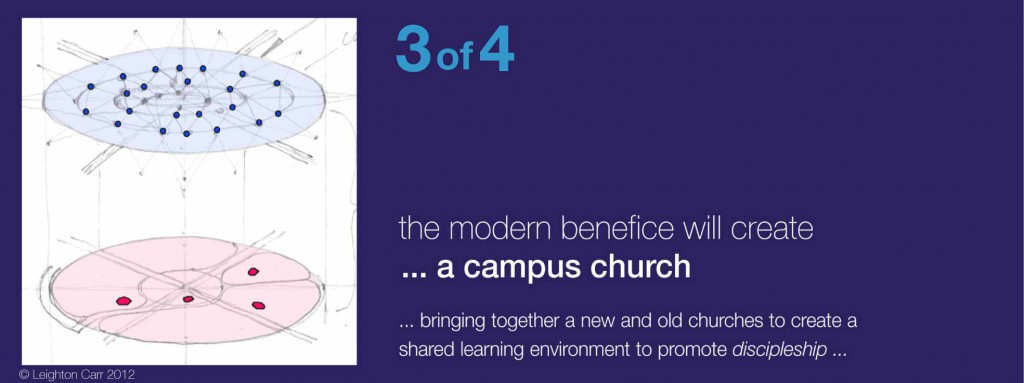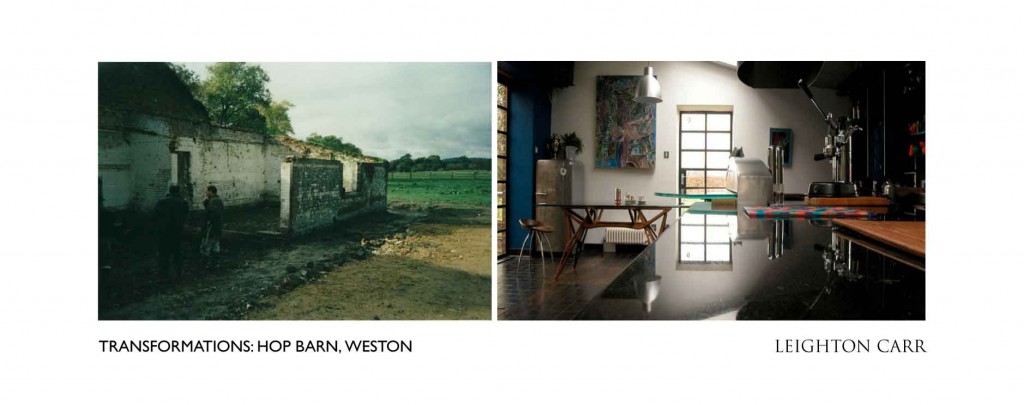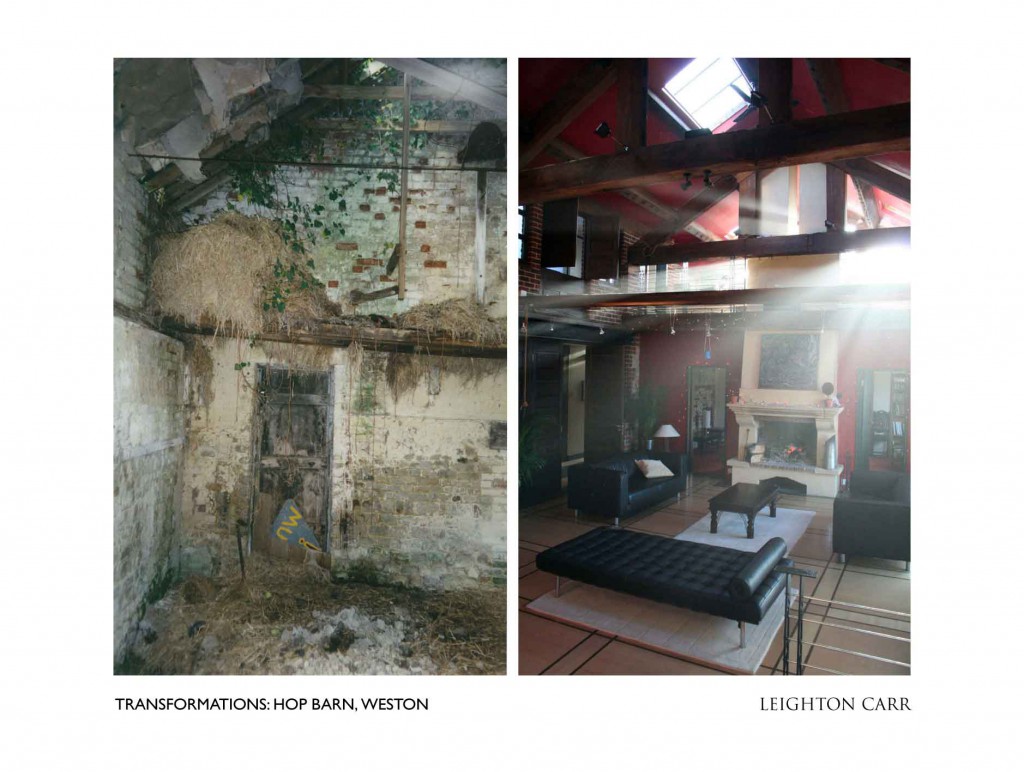The successful modern benefice in the Church of England will need to become a Campus. This means it will draw together resources for teaching, mentoring, coaching and training, for the purpose of helping Christians deepen their discipleship and witness. Lay ministers will need to work in a more flexible way, working in teams, with each person working to their strength, be it research, writing, preaching, coaching. The Campus church will also attract external resources from outside the Anglican church – theologians and educators – as well as offer resources to all local colleges and schools (not only Church of England schools!) to build up the life of society as a whole.\r\n\r\nThis is 3 of 4: see the whole poster go here\r\n\r\nOr see each individual post here: 1-Organic 2-Networked 4-Planting\r\n
Month: December 2012
Promotion, Preferment, Sacrifice
Its job hunting time for curates all over the country, and on Friday mornings new jobs are advertised in the Church Times (today’s are in Ireland, Scotland and Brittany – tempting – and a school in Ashford). Depending on the rules of their particular diocese curates in their third or fourth year have to move on and many are keen to go, ready to spread their wings and take more responsibility.\r\n\r\nAnd yet.\r\n\r\nTraining for ministry is not just about ‘learning the ropes’, as it’s inelegantly called. Occasional offices. Running a PCC meeting. Preaching. Not ruining worship services.\r\n\r\nSkills aren’t enough.\r\n\r\nAnd that is because – if leading in ministry is not empowered by a tangible, dynamic, and forceful spiritual authority then it will waste the good time of congregations and fail a world that is, according to Jesus, waiting for someone to step up (Matthew 9/Luke 10).\r\n\r\nThe alternative to a ministry of Spirit Empowered Spiritual Authority is a well practised ministry that is ineffective in the spiritual world, and consequently unfruitful in the temporal one too.\r\n\r\nSo how is spiritual authority gained?\r\n\r\nUnfortunately this aspect of the job cannot be taught by Diocesan training staff or learned easily in theological colleges.\r\nIt doesn’t come with the job, and it isn’t conferred by a hopeful PCC.\r\nIt doesn’t come automatically with the Bishop’s license to minister, and it isn’t handed out with a promotion.\r\n\r\nNo, spiritual authority in leadership comes from the public and private practice of surrender and sacrifice. And as Jesus modelled in the Gospels, it is often discovered in the desert.\r\n\r\nWhich means that in trying to make sense of some of our hardest years of leadership behind or ahead we should take encouragement from the following quote about the road to spiritual authority in leadership:\r\n\r\nIt is not won by promotion, but by many prayers and tears. It is attained by confession of sin, and much heartsearching and humbling before God; by self surrender, a courageous sacrifice of every idol, a bold uncomplaining embrace of the cross, and by an eternal, unfaltering looking unto Jesus crucified. It is not gained by seeking great things for ourselves, but like Paul, by counting those things that are gain to us as loss for Christ. This is a great price, but it must be paid by the leader who would not be merely a nominal but a real spiritual leader of men, a leader whose power is recognised and felt in heaven, on earth, and in hell.\r\n\r\nSamuel Logan Brengle
The successful modern Church of England benefice 2 – Networked
A successful modern Church of England benefice will need to be Networked. That is, it will need to work across churches of different styles, theology and history, and across parish boundaries. Networked churches will make the most of resources, limiting duplication to maximise effectiveness and sustainability. To create and environment for sustainable growth the successful benefice will draw on the expertise of many people wherever they are found, in Anglican churches and others.\r\n\r\nThis is two of four: see the whole poster go here\r\n\r\nOr see each individual post here: 1-Organic 3-Campus 4-Planting\r\n\r\n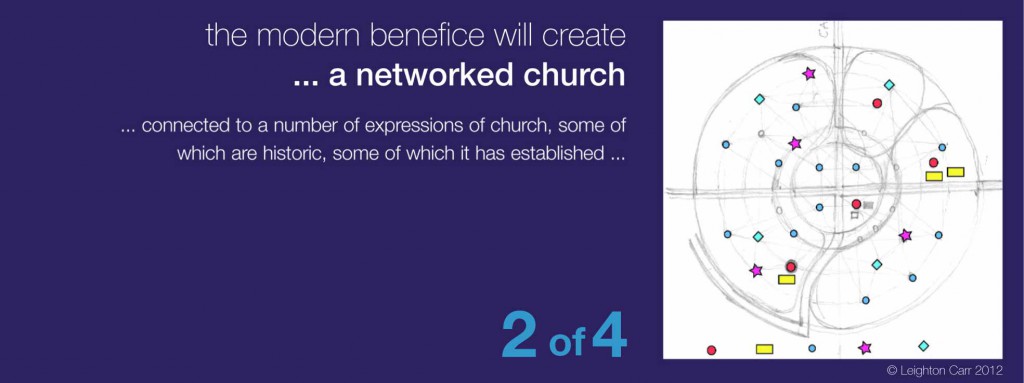 \r\n\r\n
\r\n\r\n
- The Networked Benefice
Counting blessings on the walk to work
After working way into the early hours of this morning on seemingly impossible problems, tired, under pressure, my day was suddenly elevated by the walk to work.\r\n\r\nThe sun in the city. There’s nothing like it to pick up a sluggish pace and open jaded eyes.\r\n\r\nIt’s a blessing, I think, as I pause for thought over coffee in Bordeaux Quay before heading to the studio taking photos along the way … on the iPad mini!!\r\n\r\n\r\n\r\n \r\n\r\n
Leaf (1)
The successful modern Church of England benefice 1 – Organic
A successful modern Church of England benefice will need to be Organic. That is, it will need to grow and flex within existing and new areas – geographically, physically, theologically and socially. Rigid strategies won’t cut it. Leaders will have to be creative and articulate, the people they lead will need to be patient and forgiving – and more involved! All will have to be totally committed to making it work if it is to grow. This has not been the Church of England way in recent times, but if it is survive into an uncertain future then traditional Anglican sensibilities will have to be challenged.\r\n\r\nThis is 1 of 4: see the whole poster go here\r\n\r\nOr see each individual post here: 2-Networked 3-Campus 4-Planting\r\n\r\n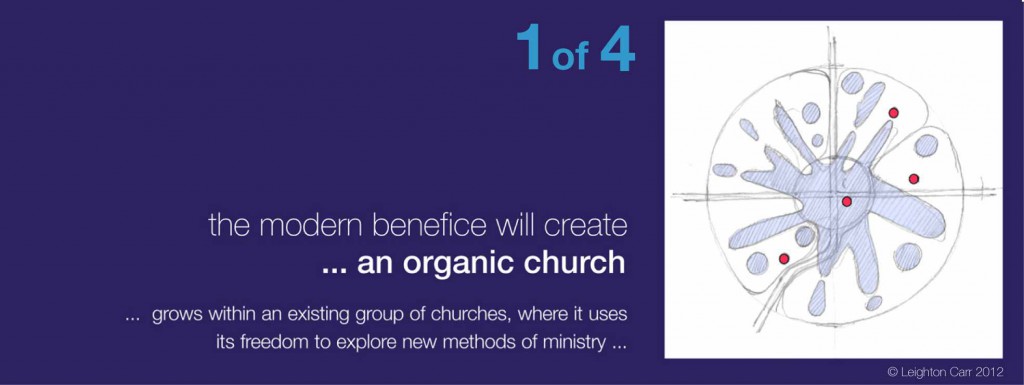 \r\n\r\n
\r\n\r\n
- The Successful Modern Benefice is … Organic
A Sofa called The Beast
We have an enormous sofa. We call it The Beast.\r\n\r\nIt’s a Tetrad four person sofa that only fits in one place in the room – in front of the radiator. It’s so big it absorbs probably three quarters of all heat emitted.\r\n\r\nWhich should make it great to sit on. Hot and Big.\r\n\r\nBut no. It’s too deep to sit on without tucking legs and feet on the cushions. Imagine a sofa larger than a single bed. And the cushions are so big that people don’t sit on them as much as climb into them, and it’s hard to see out, let alone get out, once in there. And of course guests feel uncomfortable sitting without their feet on the floor.\r\n\r\nWe bought it as part of a three sofa strategy developed to allow at least nine people to sit comfortably in the room.\r\n\r\nWhy? I really can’t remember. It was something to do with growing a church.\r\n\r\nSo we have a very big sofa.\r\nGuests don’t want to sit on it\r\nThe room is cold.\r\nAnd we never have nine people in the room at the same time.\r\n\r\nWhich made us think, if buying the sofa didn’t bring people in, maybe if we got rid of the sofa we’d have more people over?\r\n\r\nWe paused for a moment.\r\n\r\nWhen spoken out loud that sounded as farcical as the weekly Sunday conversation about removing the pews in church.\r\n\r\nAs if removing the pews would grow the church …
If God were small …
“If God were small enough to be to be understood, He would not be big enough to be worshipped.”\n\nEvelyn Underhill
